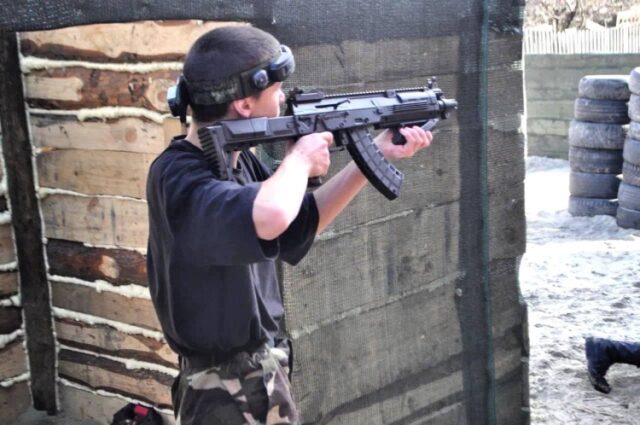
Cossack Youth Join In On ‘Breeding For War’
Publication: Eurasia Daily Monitor Volume: 21 Issue: 30
By:

Executive Summary:
- Cossack education has increasingly focused on preparing Russian youth for war.
- New Cossack cadet corps are being developed in Crimea, expanding Russia’s foothold on the peninsula.
- Cultural events celebrating Cossack traditions to “inculcate a love of the motherland in young people” are becoming more frequent, with a focus on instilling the ideology of war in children’s minds.
Russian observers have increasingly touched on Moscow’s renewed efforts to militarize youth and prepare (or “breed”) them for war (PONARS Eurasia, December 20, 2023; see EDM, February 13). Cossack education has become a cornerstone of the Kremlin’s efforts in this regard. Russian youth are being prepared to engage in the second “Great Cossack Circle [meeting]” (see EDM, February 14). The deputy Ataman for the youth of the “All-Russian Cossack Society” (VsKO), Igor Kochubeev, confirmed the “participation of youth in the work of the Second Great Circle of Russian Cossackdom.” The Kremlin continues to use its war against Ukraine to try to unite the Cossack movement under its control. To this end, Kochubeev announced a “youth Cossack circle” in March and emphasized the importance of uniting the Cossacks in Russia (VsKO, February 13). He went on to declare that 2024 would see seminars aimed at representatives of Cossack youth and societies. These organizations will help prepare grant applications for competitions held by Rosmolodezh (the Federal Youth Ministry), the “Movement of the First” (a youth movement similar to the Soviet Union’s Young Pioneers), the Presidential Grants Fund, and the Presidential Fund for Cultural Initiatives. These efforts all point to Moscow’s growing reliance on the state-registered Cossack movement to militarize Russian youth and prepare them for the current war and future conflicts.
The emphasis on youth “military-patriotic” education is being pushed in many Russian regions. Addressing the Terek Cossacks, the ataman of the VsKO, Vitaly Kuznetsov, emphasized four key points:
- “Now is the time of the strong, the time of youth.”
- “Youth is the most important thing that we have, the chief among our values.”
- “These are the future atamans, the future leaders of our Cossack units. It is they who will continue our work.”
- “Our main task is to give the youth movement a path forward” and celebrate the victory of the Terek youth movement in the recent “best Cossack class” competition (VsKO, February 12).
The competition Kuznetsov referred to occurs among various Cossack cadet corps, which are schools that aim to produce an elite group of ultra-loyal, military-prepared Cossack graduates. While over 30 cadet organizations already exist, the regime appears eager to develop more. Cossack cadets have a venerable history in Russia, stretching back to 1732 when Empress Anna Ioannovna opened the first cadet corps (VsKO.ru, February 17).
In Crimea, a new cadet organization is being developed “as fast as possible at breakneck speed.” Anton Sirotkin, ataman of the Black Sea Cossack Host—the social organization created by the Kremlin following its illegal annexation of Crimea—said that developing these organizations is “a strategic priority because the Cossack Cadets Corps is the basis of preparing a future leaders’ cadres and future atamans in the Cossack host.” Rather than building many new schools, these projects rely on Crimea’s existing infrastructure to expand their influence. Already, 10 Cossack cadet classes have opened “in five schools of Simferopol, Bakhchusaraiskogo region, Dzhankoia, and Yalta … where 217 children study.” These classes are less intensive than the cadet organizations and take place in regular schools. Their number has increased since 2016, when the first Cossack cadet class was opened in high school number 10 in Simferopol. There are plans to add another 3–4 classes and Cossack groups in preschools (VsKO.ru, February 13). Similarly, other regions also participate in Cossack youth activities below the level of cadet groups, such as the “Sakhalin Oblast Cossack Youth Union” (VsKO, February 16).
Cossack officials openly state that these education projects are intended to cultivate national pride. In a recent interview, Liudmila Miliukova, cultural department deputy director of the Black Sea Cossack voiska, explained how Cossack education “inculcates a love of the motherland in young people.” She said, “We have many meetings directed at the rebirth of Cossack traditions. … In 2022–2023, we held the exhibition ‘Where the Cossack’s Foot Goes, Peace Comes.’ There were photos of Cossacks participating in the special [military] operation [and] drawings and letters from our children to our warriors.” In this way, Cossack education programs are instilling the ideology of war and preparedness to fight in children’s minds. When asked to name the most essential activity for popularizing Cossack culture, Miliukova responded with the inter-regional festival “Crimean Glue,” which has been held since 2006 but has recently taken on new meaning. According to her, “Last year, the concert program pleased guests in different squares of Crimea, Sevastopol, Melitopol, and Zaporizhia Oblast” (Kazachestvo.ru, February 9).
Through such concerts, the Kremlin combines modern global youth forums with Cossack themes to militarize youth. Yuri Popov, an ancestral Cossack musician, details this in a recent interview on his latest album, “The Call of the Ancestors.” Popov said, “At the core, I am a rapper, but I choose to use rock and national songs. … In my work, I often feature patriotism, connections to the Cossacks, military service, discipline, and understanding of conscience and honor (Kazachestvo.ru, February 13). He goes on to recollect his family’s preservation of their Cossack heritage, which looks increasingly like a militarized “invented tradition” under its official Kremlin presentation throughout Russia. The indoctrination of youth under the guise of “reviving Cossack culture” is one of the primary ways the Kremlin has been consolidating its control over the illegally annexed regions of Ukraine (see EDM, January 25).



